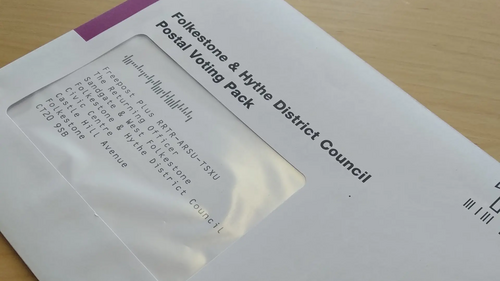The Elections Act 2022: What's Next?

An update from Paul Butler at Folkestone & Hythe District Council Elections Team on the Elections Act 2022 Tranche 2 changes, and what they will mean to voters.
The Elections Act 2022 has already brought about the implementation of voter ID, accessibility changes and PCC election voting rules.
The second part of the EA22 is called “Tranche 2” and concerns provisions relating to:
- Absent voting,
- Overseas electors,
- EU citizens’ voting and candidacy rights (as you all will know from a recent council decision),
- Postal vote handling and secrecy,
- Digital imprints,
- Commonly used names,
- New measures to prevent undue influence and intimidation; and
- Candidate addresses at UK Parliamentary elections
All parts of Tranche 2 are to come into force before and after the May 2024 Police and Crime Commissioner election.
Whilst we know the order of implementation, we are awaiting information on all of the details. Guidance is slowly coming out about each part and as it stands, the following is due to take place:
A short synopsis of each element is below, in the order of intended implementation:
Absent voting (From Oct 23)
Postal voting | A requirement for the reapplication of voting by post every 3 years, instead of a signature refresh every 5 years. If reminders are not adhered to, the elector will lose their right to vote by post and instead have to vote at the polling station. |
Proxy voting | A limit to how many people an elector can act as a proxy for. Electors will be limited to acting as a proxy for two people, regardless of their relationship. Anyone voting on behalf of UK electors who live overseas may act as a proxy for up to four people. |
Online absent voting applications | The introduction of an online portal that will allow electors the option of applying for a postal vote online. It will also be possible to apply for a proxy so long as their identity is confirmed in the process. More details are to follow on just how all of this will be carried out. At the moment, we know that if a person registers online at gov.uk and ticks to apply for a postal vote, they will be redirected to a new section to complete the application online. |
Undue influence and intimidation changes (From Nov 23)
Changes will simplify and clarify the offence of undue influence. It will define the types of illegal behaviour used to unfairly influence someone’s vote. The changes will apply to all campaign activity, printed materials and also anyone who seeks to intimidate an elector either inside or outside a polling station.
Digital imprints (From Nov 23)
Rules that govern what electronic material (social media comms, videos etc.) should include as part of that piece of campaign material – for example, but not limited to: the name and address of the promoter of the material
Overseas electors changes (From Jan 24)
There will no longer be a 15 year limit on voting rights, and the overseas registration period will change. A British citizen living abroad who has previously lived in, or been registered to vote in the UK, will have the right to vote at UK Parliamentary elections. Electors currently declare every year that they are still abroad, qualify and wish to vote from overseas. The new rule will extend the declaration period to three years.
Candidate address changes at UK Parliamentary elections (From May 24)
Parliamentary candidates can redact their home addresses on the ballot paper and statement of persons nominated.
Commonly used names (From May 2024)
Outlining the way in which a commonly used name will override another name if put on the nomination paper, and if used, the commonly used name will appear on the ballot paper instead of any other name.
Postal vote handling and secrecy rules (From May 24)
Only electors, a family member or a designated carer will be able to hand in a postal vote.
EU voting and candidacy rights changes (After May 24)
Some EU citizens will not be able to vote and stand as a candidate in certain elections.

Sign up
for email updates


